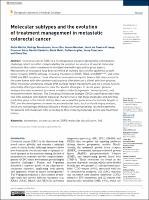Resum
Paraules clau
Biomarcadors; Càncer colorectal; Classificació molecular
Citació recomanada
Martini G, Dienstmann R, Ros J, Baraibar I, Cuadra-Urteaga JL, Salva F, et al. Molecular subtypes and the evolution of treatment management in metastatic colorectal cancer: Ther Adv Med Oncol. 2020 Jul 24;12:1–18.
Audiència
Professionals
Empreu aquest identificador per citar i/o enllaçar aquest document
https://hdl.handle.net/11351/6528Aquest element apareix a les col·leccions següents
- HVH - Articles científics [2972]
- VHIO - Articles científics [865]
Els següents fitxers sobre la llicència estan associats a aquest element:


